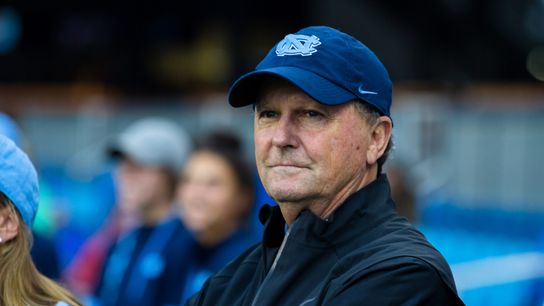It's not every day -- okay, never -- we cover women's college soccer news here at FootballScoop, but it's not every day -- okay, never -- that the most successful coach in the history of the sport, and arguably the most successful coach in the history of any college sport, calls it quits.
But that's what happened Sunday, when Anson Dorrance announced his retirement, days before what was to be his 48th season as a head coach with North Carolina soccer and his 46th season with the UNC women's team.
Dorrance founded the North Carolina women's soccer program in 1979 and won his first national championship before the NCAA sponsored the sport. The Tar Heels were Association for Intercollegiate Athletics for Women semifinalists in 1980, AIAW champions in 1981, and then the inaugural NCAA women's soccer champions in 1982. Twenty more championships followed, including nine straight from 1986-94. From 1986-93, the Tar Heels lost one game.
North Carolina fell off as Dorrance aged and women's soccer developed nationally; the Tar Heels last championship came in 2012 and the program hasn't won an ACC championship since 2019, though they did reach the Elite Eight in 2023 and the NCAA championship match in 2022.
A Tar Heel himself, Dorrance, 73, exits his alma mater with 1,106 victories, 152 ties and only 75 losses, and his 22 national championships are the most of any Division I coach in any sport. North Carolina is the only program to compete in every NCAA Division I women's soccer tournament, and its 31 College Cup appearances (the soccer equivalent of the Final Four) are 17 more than the next-closest program. Dorrance also served as the first head coach of the United States Women's National Team, leading the team to victory in the inaugural Women's World Cup.
From a broader perspective, the most interesting tidbit from Dorrance's retirement is the timing. The Tar Heels played an exhibition game Saturday, and open their season Thursday at Denver.
Dorrance modeled his program after former colleague Dean Smith, and he said it was Smith's model that led him to walk away just days before the season opener.
"As many of you know I modeled our program after Dean Smith's basketball program, and retiring at this time is a credit to his thinking, as well," Dorrance said. "He would re-evaluate his tenure, not after the season, but after he had time to recharge his batteries prior to the next season. When he didn't, he retired. After last season I initially was excited about the chance to bolster our roster, which we most certainly have done, but as preseason training camp went on, I realized I didn't have the same energy it takes to give 100% to this year's team. The players and staff, the university, Carolina athletics and our great fans deserve more, and the respect I have for the amazing legacy the current and former players have built led me to make this decision at this time."
"Anyone who knows Anson recognizes how deeply competitive he is, so to step aside now underscores his belief it is the right decision for the success of this year's team. I have great respect for him and his decision," UNC AD Bubba Cunningham said. "Everyone at Carolina thanks Anson, M'Liss, and their family for a 50-plus-year relationship with the university. He will forever be a Tar Heel."
Smith led North Carolina's men's basketball team to the Final Four in April 1997, then abruptly announced his retirement after 36 seasons and a then-NCAA record 879 wins on Oct. 9, 1997.
Like Smith, Dorrance will leave the team in the hands of his top assistant. Damon Nahans, entering what was to be his 10th season as an assistant, will lead the team as interim head coach before Cunningham begins a national search later this fall.
For his part, hopefully Dorrance's passing of the baton will go better than Smith's. Bill Guthridge led the 1997-98 Tar Heels to a 34-4 record and a Final Four berth, but by 1999-00 things had soured so badly within the program that not even a Cinderella run to the Final Four -- his second in three seasons -- could save his tenure. UNC's next hire, Matt Doherty, lasted only three seasons as well, and it wasn't until the hire of Roy Williams in 2003 that the program recovered.
Nahans leads a team that enters the fall tied for eighth in the United Soccer Rankings, with the unrivaled history of a program that practically invented women's soccer at the college level. He'll have four months to audition the full-time job, and an entire industry of colleagues and rivals that would love to take it from him.
As always, stay tuned to The Scoop for the latest.
